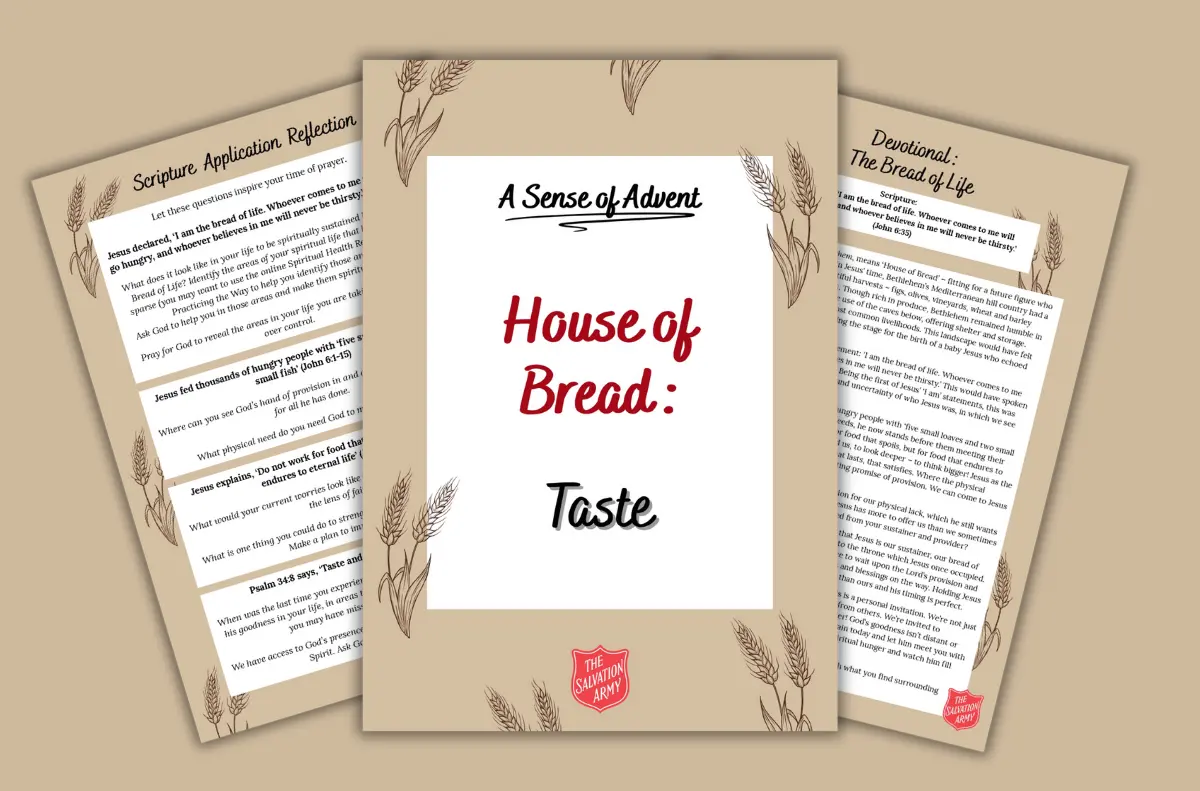House of Bread - Taste
Bethlehem’s Hebrew name, Beit Lehem, means ‘House of Bread’, fitting for a future figure who would be called the ‘Bread of Life’. Here lies subtle foreshadowing of what Jesus will become to us all – our sustainer. This prayer station allows you to reflect on your current abundance or lack, and what it truly means for Jesus to be your sustenance.
Digitally explore this prayer station through the sense of taste.

Scripture: Jesus declared, ‘I am the bread of life. Whoever comes to me will never go hungry, and whoever believes in me will never be thirsty.’ (John 6:35)
Bethlehem’s Hebrew name, Beit Lehem, means ‘House of Bread’ – fitting for a future figure who would be called the ‘Bread of Life’. In Jesus’ time, Bethlehem’s Mediterranean hill country had a reputation for fertile land and bountiful harvests – figs, olives, vineyards, wheat and barley flourished in the surrounding valleys. Though rich in produce, Bethlehem remained humble in stature. Its modest homes often made use of the caves below, offering shelter and storage. Shepherding and farming were the most common livelihoods. This landscape would have felt both humble and plentiful, quietly setting the stage for the birth of a baby Jesus who echoed these sentiments.
In John 6:35 Jesus makes a powerful statement: ‘I am the bread of life. Whoever comes to me will never go hungry, and whoever believes in me will never be thirsty.’ This would have spoken directly to his audience for many reasons. Being the first of Jesus’ ‘I am’ statements, this was spoken into a social context of scepticism and uncertainty of who Jesus was, in which we see Jesus speak the truth of his identity.
Just the day before, Jesus fed thousands of hungry people with ‘five small loaves and two small fish’ (John 6:1-15). Having met their physical needs, he now stands before them meeting their spiritual needs. Jesus explains, ‘Do not work for food that spoils, but for food that endures to eternal life’ (v27). Jesus is challenging them, and us, to look deeper – to think bigger! Jesus as the Bread of Life speaks of a spiritual sustenance that lasts, that satisfies. Where the physical satisfactions of this world will pass, he is our lasting promise of provision. We can come to Jesus to meet every need.
So the first challenge is not only to seek his provision for our physical lack, which he still wants to meet, but also to contest for our spiritual lack. Jesus has more to offer us than we sometimes realise. What in the depths of your heart do you need from your sustainer and provider?
The second challenge is whether we can say in truth that Jesus is our sustainer, our bread of life. Many things in our hearts and lives can sneak on to the throne which Jesus once occupied. When we have unmet needs, we often lack the patience to wait upon the Lord’s provision and wish to fast-track the journey, missing valuable lessons and blessings on the way. Holding Jesus as our sustainer requires trust, that his ways are higher than ours and his timing is perfect.
Psalm 34:8 says, ‘Taste and see that the Lord is good.’ This is a personal invitation. We’re not just called to know about God or hear stories of his goodness from others. We’re invited to experience him for ourselves – to taste, to see, to encounter! God’s goodness isn’t distant or theoretical; it’s daily, present, and personal. So seek him again today and let him meet you with what he knows you need most. Ask God to increase your spiritual hunger and watch him fill you.
As you sit at the prayer station, take a breath and interact with what you find surrounding you, allowing the words of this devotional to wash over you.

Let these questions inspire your time of prayer.

Jesus declared, ‘I am the bread of life. Whoever comes to me will never go hungry, and whoever believes in me will never be thirsty.’ (John 6:35)
What does it look like in your life to be spiritually sustained by Jesus, the Bread of Life? Identify the areas of your spiritual life that have grown sparse (you may want to use the online Spiritual Health Reflection from Practicing the Way to help you identify those areas).
Ask God to help you in those areas and make them spiritually abundant.
Pray for God to reveal the areas in your life you are taking lead on – hand over control.

Jesus fed thousands of hungry people with ‘five small loaves and two small fish’ (John 6:1-15)
Where can you see God’s hand of provision in and around you? Give thanks for all he has done.
What physical need do you need God to meet? Let him know.

Jesus explains, ‘Do not work for food that spoils, but for food that endures to eternal life’ (John 6:27)
What would your current worries look like if you considered them through the lens of faith?
What is one thing you could do to strengthen your relationship with God? Make a plan to implement this.

Psalm 34:8 says, ‘Taste and see that the Lord is good.’
When was the last time you experienced God’s goodness? Ask God to reveal his goodness in your life, in areas that you may have overlooked or where you may have missed his hand completely.
We have access to God’s presence at all times through the power of his Holy Spirit. Ask God for a fresh encounter.
